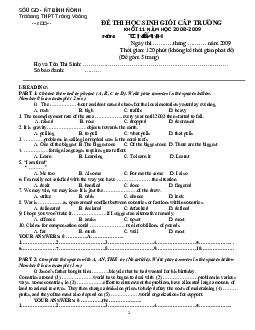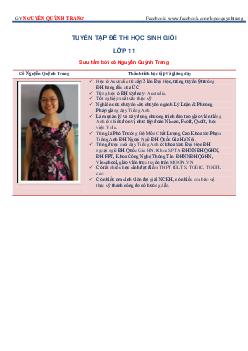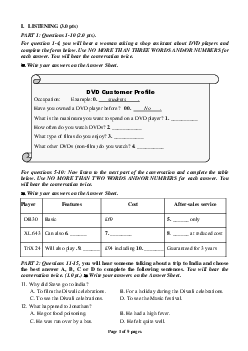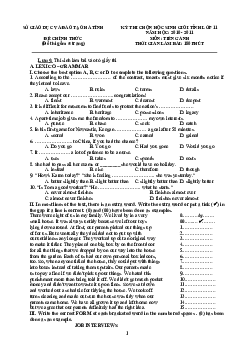





Preview text:
SỞ GD&ĐT VĨNH PHÚC
KỲ THI CHỌN HSG LỚP 10, 11 THPT NĂM HỌC 2016-2017 ĐỀ THI MÔN: ANH 11 - THPT ĐỀ CHÍNH THỨC
Thời gian làm bài: 180 phút, không kể thời gian phát đề. PART I. LISTENING
Session 1. Listen to a senior teacher Ms. Potts discussing an assessment schedule for the next academic year
with a new teacher, John and do the tasks that follow. The recording will be played TWICE.
Questions 1-3. Listen to the conversation and choose the correct option to complete the sentences.
1. Ms. Potts prefers to work with _______________. A. a computer B. a pencil and paper C. spreadsheets
2. She believes it is essential to have _______________. A. a good system B. the final exam C. one major assessment
3. John thinks continuous assessment _______________. A. makes him sick B. affects his performance C. is fair
Questions 4-10. Complete the table. Write no more than THREE WORDS AND/ OR A NUMBER for each answer. ASSESSMENT SCHEDULE January
No assessment - summer holiday February
4. ______________; set essay topics March
Field trip; 5. ______________ with photographs April
6. ______________ with visual aids. Break May
A 7. ______________ of quizes (short-answer questions) June Mid-year exams July
Break. 8. ______________ August 9. ______________ September
10. ______________. Break. October Test November Final exam December
No assessment - summer holiday
Session 2. Listen to two students talking about a music course and do the tasks that follow. The recording will be played TWICE.
Questions 1-3. According to Josie, which THREE things are necessary for Music 103? Choose THREE letters A-H. A. ability to read music B. ability to sing C. computer skills
D. ability to play a musical instrument E. good maths
F. independent learning skills
G. membership of the music department
Questions 4-6. Which THREE of the following activities does Music 103 involve? Choose THREE letters A-H.
A. designing a software programme
B. writing and playing back your own music C. writing music for films
D. attending lectures at the university
E. listening to examples from the Internet F. going on study tours abroad
G. comparing modern and classical music Page 1 of 6
Questions 7-8. List TWO more things a student’s computer needs for Music 103. Write NO MORE THAN TWO
WORDS AND/OR A NUMBER for each answer. 7. ________ megabytes of RAM CD-ROM 8. ________
Questions 9-10. Answer the questions below. Write NO MORE THAN TWO WORDS AND/OR A NUMBER for each answer.
9. When does the next course begin? _____________.
10. How many assignments must be done to pass the course ? _____________. PART II. LEXICO-GRAMMAR
Session 1. Choose the best option (A, B, C or D) to complete each of the following sentences.
1. Would you mind ________ me a favour and post this letter for me? A. making B. doing C. getting D. causing
2. It is important that your facebook password ________ confidential. A. keeping B. kept C. be kept D. keeps
3. You should look up the meaning of that word in the dictionary________ misuse it again. A. in order to not B. in case C. so as not to D. unless
4. I would be very rich now ________ working long ago.
A. if I would give up B. if I didn’t give up C. were I to give up D. had I not given up
5. I know you have been working very hard today. Let's ________ and go home. A. pull your leg B. call it a day C. mind your manners D. split the bill
6. It seems to me that your sister won’t be able to do this sum ______ you help her. A. as long as B. imagining C. unless D. supposing
7. All children have the right to an education ________of their sex, creed, race or nationality. A. regardless B. providing C. despite D. because
8. Mark first________ his wife three years ago when they _________at university.
A. met - have studied B. met - were studying C. has met - studied D. met - study
9. Tom: “Sorry, I forgot to phone you last night.” Mary: “________!” A. It’s a bit dear B. Oh. Poor man C. Never mind D. My pleasure
10. Children should be ________ by their parents on the first day of school. A. accompanied B. stalked C. involved D. associated
11. People have used coal and oil to ________ electricity for a long time. A. discover B. invent C. raise D. generate
12. We are considering having ________ for the coming New Year.
A. redecorating our flat B. redecorate our flat C. our flat to be redecorated D. our flat redecorated
13. She should have been here but she’s ________ flu.
A. gone through with B. gone down with C. come in for D. come up against
14. The salary of a computer programmer is ________ a teacher. A. twice more than
B. as much as twice of C. more than twice D. twice as much as that of
15. Tony didn’t study hard for the test. His answers ________ from someone else.
A. should have copied B. can have copied
C. must have been copied D. would have copied
16. No one had informed me about that. I resented________. A. not to be informed B. not having been informed C. not to inform D. not informing
17. Safety should take _________over all other matters in the workplace. Page 2 of 6 A. precede B. precedent C. preceding D. precedence
18. _________, these students are among the best prepared who have been through this university. A. On the whole B. At the whole C. In the general D. In generally
19. Caller: “Can I speak to Mr James, please!” Secretary: “________”
A. No problem! I’m fine with that. B. It’s his turn.
C. I’m sorry, he’s away at the moment. D. Can you take a message?
20. By 1820, there were over sixty steamboats on the Mississippi river, _______ were quite luxurious. A. which many B. many of them C. many of which D. many that
Session 2. In each line of the following passage, there is an error. Write down the line number, the corresponding
error, and correct it. There is an example at line 11. Line number Mistake Correction 11 modest modesty … … …
Clothing is a distinctly human artifact. Even more than an use of tools, it distinguishes humans
from other creatures on this planet. While there are other creatures who use implements in a greater
or lesser degree, clothing is unique to humanity. Clothing is also uniquely human in what it serves
more than one function. The basis purpose of clothing was originally utilitarian. By putting on an
artificial skin, humans were unable to move into regions where they otherwise would have been
unable to cope with the climate. An extreme example of this use of clothing can see among the
Eskimos, and other people who live with extreme cold. However, clothing was not yet used for
protection from the elements, but has also been a mean of displaying one's status and sense of style
for as long as humans have had civilisation. Thus clothing also developed in countries which there
is no real practical need for it, except from the other, very human function of preserving the modest of the wearer.
Session 3. Complete the following passage by supplying the correct form of the word to the right of each line. FOOD PRODUCTION
In the not-too-distant past farm animals were able to live (1)_____________ lives NATURE
in what we would now term 'free-range' conditions. Such farming methods, however,
were not able to supply the rapidly growing (2) ______________ of the world and the POPULATE
increasing demands on food (3)______________. CONSUME
In order to cope with those ever-increasing demands, factory farming methods
were introduced along with the (4)______________ of genetically engineered DEVELOP
(5)______________ hormones, which together resulted in a massive increase in food GROW (6)______________. PRODUCE
However, these developments in the use of factory farming and drug (7)________ TREAT
have led to a widespread feeling that animals are being caused a lot of distress and
that the quality of the food (8)______________ suffers as a consequence. Certainly, many IT
people (9)______________ with the idea of keeping animals in one building for their AGREE
entire existence and argue that more emphasis should be given to (10)_______________ ALTERNATE farming methods. Page 3 of 6 PART III. READING
Session 1. Read the passage and choose the best answer (A, B, C or D) to each of the questions that follows.
According to sociologists, there are several different ways in which a person may become recognized
as the leader of a social group in the United States. In the family, traditional cultural patterns confer
leadership on one or both of the parents. In other cases, such as friendship groups, one or more persons may
gradually emerge as leaders, although there is no formal process of selection. In larger groups, leaders are
usually chosen formally through election or recruitment.
Although leaders are often thought to be people with unusual personal ability, decades of research
have failed to produce consistent evidence that there is any category of “natural leaders”. It seems that there
is no set of personal qualities that all leaders have in common; rather, virtually any person may be
recognized as a leader if the person has qualities that meet the needs of that particular group.
Furthermore, although it is commonly supposed that social groups have a single leader, research
suggests that there are typically two different leadership roles that are held by different individuals.
Instrumental leadership is leadership that emphasizes the completion of tasks by a social group. Group
members look to instrumental leaders to “get things done”. Expressive leadership, on the other hand, is
leadership that emphasizes the collective well-being of a social group’s members. Expressive leaders are less
concerned with the overall goals of the group than with providing emotional support to group members and
attempting to minimize tension and conflict among them. Group members expect expressive leaders to
maintain stable relationships within the group and provide support to individual members.
Instrumental leaders are likely to have a rather secondary relationship to other group members. They
give orders and may discipline group members who inhibit attainment of the group’s goals. Expressive
leaders cultivate a more personal or primary relationship to others in the group. They offer sympathy when
someone experiences difficulties or is subjected to discipline, are quick to lighten a serious moment with
humor, and try to resolve issues that threaten to divide the group. As the differences in these two roles
suggest, expressive leaders generally receive more personal affection from group members; instrumental
leaders, if they are successful in promoting group goals, may enjoy a more distant respect.
1. What does the passage mainly discuss?
A. The problems faced by leaders
B. How leadership differs in small and large groups
C. How social groups determine who will lead them
D. The role of leaders in social groups
2. The passage mentions all of the following ways by which people can become leaders EXCEPT________. A. recruitment B. formal election process
C. specific leadership training
D. traditional cultural patterns
3. In mentioning “natural leaders” in paragraph 2, the author is making the point that ________.
A. few people qualify as “natural leaders”
B. there is no proof that “natural leaders” exist
C. “natural leaders" are easily accepted by the members of a social group
D. “natural leaders” share a similar set of characteristics
4. Which of the following statements about leadership can be inferred from paragraph 2?
A. A person who is an effective leader of a particular group may not be an effective leader in another group.
B. Few people succeed in sharing a leadership role with another person.
C. A person can best learn how to be an effective leader by studying research on leadership.
D. Most people desire to be leaders but can produce little evidence of their qualifications.
5. The passage indicates that instrumental leaders generally focus on ________. Page 4 of 6
A. ensuring harmonious relationships
B. sharing responsibility with group members C. identifying new leaders D. achieving a goal
6. The underlined word “collective” in paragraph 3 is closest in meaning to ________. A. necessary B. typical C. group D. particular
7. The underlined word “them” in paragraph 3 refers to ________.
A. expressive leaders B. goals of the group C. group members D. tension and conflict
8. As mentioned at the beginning of paragraph 4, a “secondary relationship” between a leader and the members
of a group could best be characterized as ________. A. distant B. enthusiastic C. unreliable D. personal
9. The underlined word “resolve” in paragraph 4 is closest in meaning to ________. A. avoid repeating B. talk about
C. avoid thinking about D. find a solution for
10. Paragraphs 3 and 4 organize the discussion of leadership primarily in terms of ________.
A. examples that illustrate a problem B. cause and effect analysis C. narration of events D. comparison and contrast
Session 2. Choose the correct answer to complete each gap in the following passage by writing the corresponding letter
A, B, C or D on your answer sheet. MY DUTCH HOLIDAY
It was the first time I had ever been to Holland before and when I set off in early September, I never
(1) ________ what adventures lay ahead of me.
In order to (2) ________ the most of my time, I had carefully planned a route to (3) ________ a number of
small islands as well as some pretty countryside. I reached Wijkam See, a (4) ________ starting point for
cyclists where a local tourist office gave out information. I headed off along one of Holland’s many cycle
tracks which (5) ________ out of town and made my way to Holtheim, where I had planned to spend my first night.
From personal (6) ________ , when you are travelling on your own, unexpected and often pleasant
surprises tend to crop up and this trip was no (7) ________ . I popped into a local bar in the outskirts of
Amsterdam for a coffee and ended up chatting with a really friendly man who turned (8) ________ to be the
owner of the only restaurant in the village. He insisted on (9) ________ me for lunch. Not only that, but he
(10) ________ two enormous glasses of beer to celebrate! After a delicious lunch, Johann (11) ________ me luck
on the rest of my cycling trip and gave me the address of a friend in Amsterdam who would (12) ________ me
up for the night. Not a bad start to my first day in the Netherlands. 1. A. wondered B. doubted C. imagined D. realised 2. A. take B. gain C. serve D. make 3. A. consist B. contain C. include D. conclude 4. A. appropriate B. adequate C. convenient D. capable 5. A. lead B. reach C. ride D. join 6. A. knowledge B. belief C. experience D. viewpoint 7. A. contrast B. difference C. opposite D. exception 8. A. into B. in C. up D. out 9. A. arrange B. inviting C. paying D. give 10. A. asked B. ordered C . demanded D. fixed 11. A. hoped B. sent C. wished D. expected 12. A. put B. pass C. stay D. keep
Session 3. Read the passage and fill in each numbered gap with ONE suitable word.
Whatever you do in tourism, you are likely to have a (1) ________ of contact with other people. This
can be both enjoyable (2) ________ difficult. You will soon find out how often people behave unlike their usual Page 5 of 6
selves while (3) ________ holiday, or trying to arrange a holiday. (4) ________ they stay in their own country or
go abroad, they want to get away from it all: they (5) ________ paying hard-earned money to relax from work,
and they want value (6) ________ money.
They will also be in unfamiliar surroundings and unsure of themselves. When things go well their
happiness is infectious - it is very rewarding helping others and contributing (7) ________ the enjoyment of their
holiday. When things go badly, clients blame the hotel staff or tour operator's representative, (8) ________ if it
isn't their fault. You've just got to keep calm and keep smiling when people are shouting at you. PART IV: WRITING
Session 1. Combine the following pairs of sentences using the suggestions given.
1. Richard was exhausted after the long trip. Still, he helped me to cook dinner.
Exhausted ____________________________________________________________________.
2. Joaquin wanted to brush up on his English. Therefore, he enrolled on a course at the language centre.
Since ___________________________________________________________________________.
3. The old woman had never visited Mecca before. She was mightily impressed.
Not _____________________________________________________________________________.
4. Harry had failed in his driving test. I was not surprised at all to hear that.
It _______________________________________________________________________________.
5. Mr Mitchell was very interested in our plan. I spoke to him on the phone last night.
Mr Mitchell, ___________________________________________________________________.
Session 2. Rewrite each of the following sentences in such a way that it has a similar meaning to the one printed before it.
1. He will be returning from Africa quite soon.
It won't ________________________________________________________________________.
2. You can use it as long as you like, and it won't wear out.
No matter _____________________________________________________________________.
3. My little sister always blames me for everything that goes wrong.
My little sister always puts __________________________________________________.
4. Don't pay any attention to what she says.
Take ___________________________________________________________________________.
5. The headmaster will give special prizes to the top five students of the year.
The top five students _________________________________________________________. Session 3: Essay writing.
Some people say that the only reason for learning a foreign language is in order to travel to or work
in a foreign country. Others say that these are not the only reasons why someone should learn a foreign language.
Which point of view do you agree with? Write at least 250 words. -------Hết-------
Thí sinh không được sử dụng tài liệu. Cán bộ coi thi không giải thích gì thêm.
Họ và tên thí sinh:…………………….………. …….…….….….; Số báo danh:………………………. Page 6 of 6




